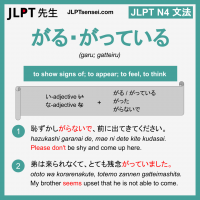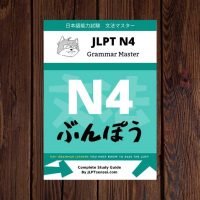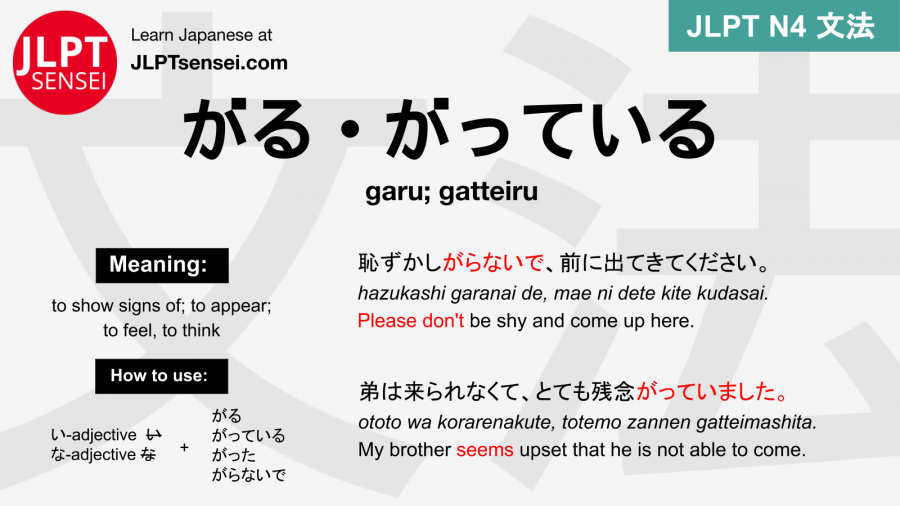Aprende gramática del idioma Japonés: がる (garu) meaning: to show signs of; to appear; to feel, to think.
This grammar point basically turns adjectives into verbs, so the tense can change based on the verb conjugation. Let’s look at some examples:
がる – to show signs of; to feel
General Use
彼は犬を怖がる。
kare wa inu o kowa garu.
He is (appears to be/seems to be) generally afraid of dogs.
Current Tense
彼は犬を怖がっている。
kare wa inu o kowa gatteiru.
He is currently showing signs of being afraid of dogs.
Current Tense
彼は犬を怖がっていた。
kare wa inu o kowa gatteita.
He was showing signs of being afraid of dogs.
ほしがる (hoshi garu) – to want
ほしい + がる combine to express a strong desire or want for something. Of course, any adjective can be converted to a verb, but this form is quite common.
クルーズ先生は新しい自転車を欲しがる。。
Cruise sensei wa atarashii jitensha o hoshi garu.
Cruise-sensei wants a new bicycle (very badly).
Extra Study Notes
がる (garu) is generally used for speaking in the 3rd person, but it is also acceptable to use it for yourself in some situations.

Click the image to download the flashcard.
Download all N4 grammar flashcards.

Download our complete
JLPT N4 Grammar Master E-book.
Access ALL extra downloads, ebooks, and study guides by supporting JLPT Sensei on Patreon.
がる・がっている - Oraciones de ejemplos 例文
Cada oración de ejemplo incluye ayudas como la lectura (hiragana) en Japónes, la lectura en romaji, y la traducción en Español.
Da clic en el siguiente botón rojo para alternar todas las ayudas, o puedes dar clic en los botones individuales para mostrar únicamente las que desees ver.
Ejemplo #1
怖がらないでください。
Ejemplo #2
試合に負けて悔しがる。
Ejemplo #3
彼は死ぬのを怖がっている。
Ejemplo #4
弟は来られなくて、とても残念がっていました。
Ejemplo #5
恥ずかしがらないで、前に出てきてください。
Ejemplo #6
彼女はその少年をまるで実の子のようにかわいがっている。
Vocabulario 語彙
| Kanji 漢字 |
Kana カナ |
English 英語 |
|---|---|---|
| 彼 | かれ | he |
| 犬 | いぬ | dog |
| 怖い | こわい | scary; frightening |
| 新しい | あたらしい | new |
| 自転車 | じてんしゃ | bicycle; bike |
| 欲しい | ほしい | to want |
| 恥ずかしい | はずかしい | Embarrassing |
| 試合 | しあい | match; game |
| 負ける | まける | to lose |
| 悔しい | くやしい | frustrating |
| 残念 | ざんねん | unfortunate; regrettable |
Ver todas las lecciones de gramática del JLPT N4



